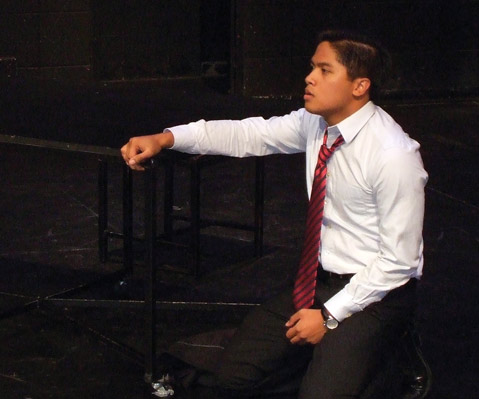Measure for Measure at UCSB
Shakespeare’s Darkest Comedy Gets Wild on Thursday, September 8

Shakespeare’s last comedy, Measure for Measure ends with several more or less awkward matches and a single, insidiously unanswered proposal of marriage. The unorthodox ending reveals much about the tone of the entire drama, which often undermines life-affirming sentiments by putting them in the mouths of scoundrels, or complicates expressions of rigorous retributive justice — as in the title’s assertion of “measure for measure” — by having their authors contradict them in their actions.
The story takes place in a riotously corrupt Vienna, represented in this exciting and intelligent production as teeming with prostitution and public licentiousness. In order to tame his unruly subjects, the Duke of Vienna (Joe Samaniego) abdicates, leaving as his deputy the puritanical Angelo (Julian Remulla), and returning disguised as Friar Lodowick in order to observe the impact of his absence and of Angelo’s regime. As the Friar, the Duke soon goes beyond the role of observer, and chooses to meddle in several existing and emerging scandals. Indeed, the play’s two most remarkable contrivances — the “head” and “bed” tricks, in which sexual partners and condemned men perform sneaky substitutions — are the Duke’s ideas, conceived and executed from his disguised role as the Friar. In the play’s tumultuous final act, he must “return” to unravel the mystifying web of substitutions and false representations he has woven.
There’s a lot to like in this fast-paced production, which makes the uproarious decadence of the street into an integral part of the finale’s mystical message. As the rogue Lucio, Allie Granat nearly runs away with several scenes, taking advantage of the stage whiskers she wears and the male role she plays to develop a wonderfully rounded physical characterization. Likewise, Jamie Perkins makes the most of her male role, that of the reasonable and judicious Escalus, attendant to both the Duke and Angelo. Operating at the limits of the play’s broad range of respectability, these two characters nevertheless unite in forcing the Duke to acknowledge his subterfuge and pick up the pieces of the puzzle he has made.
At the head of the bawdy chorus of streetwalkers played by Lina Madrid, Lexi Lee, Jennifer Luan, and Mary Mehrkens is the anarchic and extremely funny tapster Pompey, portrayed admirably by Ian Watson. His interlude before the court with the beguiling and disorderly Mistress Froth (Kalila Griffith) serves as a kind of comic counterpoint to the main plot.
The convent ought to be at a safe remove from the whorehouse, but not in this play, where the two settings blur and even seem to overlap. As Isabella, the novice and sister to the condemned man Claudio (Chris Costanzo), Christine Buccelli does a beautiful job of balancing a daunting array of qualities. She’s girlish in her reticence and naïveté, fanatical in her high-minded religious hauteur, and tragically sympathetic in her indecision. As Mariana, the exiled former love of Angelo, Nicole Abramson pulls off several of the production’s theatrical coups, including a marvelously suspenseful unveiling in Act Four.
The three principal male roles are all played by actors who succeed in being as complex and enigmatic as the mysterious figures they portray. In his neatly tailored contemporary business suit, Julian Remulla’s Angelo offers a particularly haunting image of the play’s central concerns of mortality and mercy. Angelo, like the “masters of the universe” who populate the boardrooms of global banks today, evinces a peculiar mixture of severity and license. He’s the hypocrite in the gray flannel suit, and he’s at least as real today as he was when Shakespeare imagined him.



